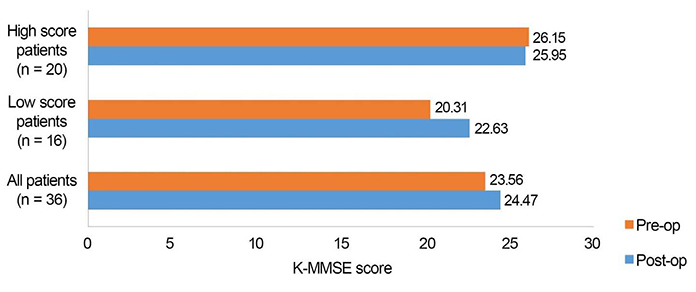J Korean Ophthalmol Soc.
2019 Jan;60(1):25-31. 10.3341/jkos.2019.60.1.25.
The Effect of Cataract Surgery on Cognitive Function in Elderly Adults
- Affiliations
-
- 1Department of Ophthalmology, Veterans Health Service Medical Center, Seoul, Korea. drskchoi@hanmail.net
- KMID: 2431836
- DOI: http://doi.org/10.3341/jkos.2019.60.1.25
Abstract
- PURPOSE
To investigate the correlation between cataract surgery and cognitive function using the Korean-mini mental state Examination (K-MMSE).
METHODS
We performed cataract extraction with phacoemulsification and intraocular lens implantation in 138 eyes of 87 patients, from 2014 to 2016, with subjective cognitive complaints. K-MMSE was used to measure cognitive function of the patients before and after surgery, and the results were analyzed using the paired t-test.
RESULTS
The mean age of the patients was 76.09 ± 6.52 years. The preoperative mean K-MMSE score was 23.44 ± 4.12 and the postoperative mean K-MMSE score was 24.49 ± 3.19. The increase in the postoperative K-MMSE score from that of the preoperative score was significant. Among the 87 patients who participated in the study, 36 patients were treated with unilateral cataract surgery and 51 patients were treated with bilateral cataract surgery. The mean ages were 76.36 ± 6.68 years and 75.90 ± 6.47 years, respectively. The mean K-MMSE scores significantly increased in both unilateral and bilateral patients (0.91 ± 1.96 and 1.15 ± 2.73 points, respectively). The difference in the increase in the mean K-MMSE score was not significant between the two groups. When analyzed according to the K-MMSE score, only those who initially scored < 23 points showed significant improvement in cognition function, which was not associated with the improvement in the best-corrected visual acuity improvement.
CONCLUSIONS
There was an improvement of the K-MMSE score after cataract surgery, indicating that cataract surgery not only enhanced visual acuity but also had a positive effect on the patients' cognitive function. When considering cataract surgery in older patients, this improvement in cognition could lead to a better life, which should be taken into consideration.
MeSH Terms
Figure
Reference
-
1. Resnikoff S, Pascolini D, Etya’ale D, et al. Global data on visual impairment in the year 2002. Bull World Health Organ. 2004; 82:844–851.2. Rim TH, Kim MH, Kim WC, et al. Cataract subtype risk factors identified from the Korea National Health and Nutrition Examination survey 2008-2010. BMC Ophthalmol. 2014; 14:4.
Article3. Sachdev PS, Blacker D, Blazer DG, et al. Classifying neurocognitive disorders: the DSM-5 approach. Nat Rev Neurol. 2014; 10:634–642.
Article4. Kim YJ, Han JW, So YS, et al. Prevalence and trends of dementia in Korea: a systematic review and meta-analysis. J Korean Med Sci. 2014; 29:903–912.
Article5. Anstey KJ, Luszcz MA, Sanchez L. Two-year decline in vision but not hearing is associated with memory decline in very old adults in a population-based sample. Gerontology. 2001; 47:289–293.
Article6. Reischies FM. Age-related cognitive decline and vision impairment affecting the detection of dementia syndrome in old age. Br J Psychiatry. 1997; 171:449–451.
Article7. Kempen JH, Krichevsky M, Feldman S. Effect of visual impairment on neuropsychological test performance. J Clin Exp Neuropsychol. 1994; 16:223–231.
Article8. Kang Y, Na DL, Hahn SH. A validity study on the Korean minimental state examination (K-MMSE) in dementia patients. J Korean Neurol Assoc. 1997; 15:300–308.9. Hall TA, McGwin G Jr, Owsley C. Effect of cataract surgery on cognitive function in older adults. J Am Geriatr Soc. 2005; 53:2140–2144.
Article10. Grodstein F, Chen J, Hankinson SE. Cataract extraction and cognitive function in older women. Epidemiology. 2003; 14:493–497.
Article11. Tamura H, Tsukamoto H, Mukai S, et al. Improvement in cognitive impairment after cataract surgery in elderly patients. J Cataract Refract Surg. 2004; 30:598–602.
Article12. Ishii K, Kabata T, Oshika T. The impact of cataract surgery on cognitive impairment and depressive mental status in elderly patients. Am J Ophthalmol. 2008; 146:404–409.
Article13. Jefferis JM, Clarke MP, Taylor JP. Effect of cataract surgery on cognition, mood, and visual hallucinations in older adults. J Cataract Refract Surg. 2015; 41:1241–1247.
Article14. Gray CS, Karimova G, Hildreth AJ, et al. Recovery of visual and functional disability following cataract surgery in older people: Sunderland Cataract Study. J Cataract Refract Surg. 2006; 32:60–66.
Article15. Yu WK, Chen YT, Wang SJ, et al. Cataract surgery is associated with a reduced risk of dementia: a nationwide population-based cohort study. Eur J Neurol. 2015; 22:1370–1377.
Article16. Miyata K, Yoshikawa T, Morikawa M, et al. Effect of cataract surgery on cognitive function in elderly: results of Fujiwara-kyo Eye Study. PLoS One. 2018; 13:e0192677.
Article17. Kondratova AA, Kondratov RV. The circadian clock and pathology of the ageing brain. Nat Rev Neurosci. 2012; 13:325–335.
Article18. Ayaki M, Muramatsu M, Negishi K, Tsubota K. Improvements in sleep quality and gait speed after cataract surgery. Rejuvenation Res. 2013; 16:35–42.
Article19. Folstein MF, Folstein SE, McHugh PR. Mini-mental state. A practical method for grading the cognitive state of patients for the clinician. J Psychiatr Res. 1975; 12:189–198.
- Full Text Links
- Actions
-
Cited
- CITED
-
- Close
- Share
- Similar articles
-
- Influence of Cochlear Implantation on Cognitive Function in Elderly Patients
- The Mediating and Moderating Effects of Types of Internet Use in the Relationship between Age and Cognitive Function among Community-Dwelling Older Adults
- The Effect of Depression and Cognitive Function on the Geriatric Oral Health Assessment Index in the Elderly
- Effects of Cognitive-based Interventions of Older Adults with Mild Cognitive Impairment: A Systematic Review and Meta-analysis
- The Effect of Dual Sensory Impairment on Cognitive Function Decline in the Elderly: The Moderating Effect of Social Support


